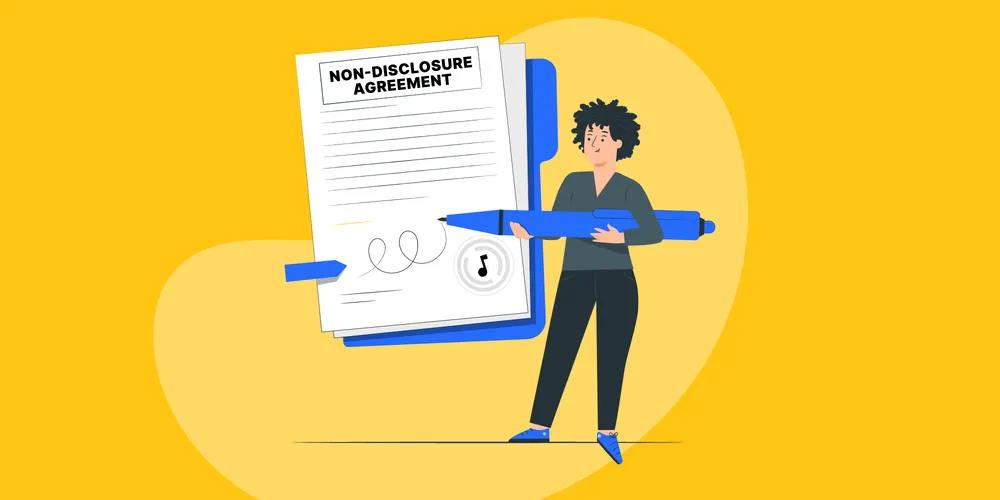The music industry is a world of creativity, talent and collaboration. However, it is also an environment where the protection of privacy and copyright is crucial. In this article, we explain the importance of music confidentiality agreements, how they work and how they can protect the interests of artists, songwriters, producers and other industry professionals.
What are music confidentiality agreements?
Music Non-Disclosure Agreements are legal contracts designed to protect confidential and proprietary information within the music industry. Their main purpose is to protect the privacy and copyrights of the artists, songwriters, producers and other professionals involved. These agreements ensure that sensitive information, such as unreleased musical compositions, demos, arrangements, lyrics, production techniques and marketing strategies, is kept strictly confidential and not disclosed or used without authorisation. By defining the confidentiality obligations of the parties involved, confidentiality agreements protect intellectual property and foster an environment of trust and cooperation in the music industry.
What do non-disclosure agreements cover in the music industry?
Music creation and production
During the creation and production process, artists, songwriters, producers and other team members may be exposed to new music, lyrics, album concepts, release strategies and other information that has not been made public. Confidentiality agreements can be used to prevent unauthorised disclosure of this information.
Contracts and Negotiations
Negotiating contracts in the music industry often involves financial details and other sensitive terms. A confidentiality agreement can be used to ensure that these negotiations remain private.
Media and Press Relations
Journalists and other media are often asked to sign confidentiality agreements before receiving information about new releases, tours or other important events in an artist’s career.
Work of employees and contractors
Employees and contractors working for record labels, artists or managers can have access to a wide range of sensitive information. Confidentiality agreements can be used to prevent unauthorised disclosure of this information, both during and after their employment or contract.
Music Collaborations and Performances
When artists collaborate on a project, or when an artist submits music to another artist, producer or label, a confidentiality agreement can be used to protect the music and ideas submitted.
Key provisions of confidentiality agreements
Non-disclosure agreements in the music industry often contain key clauses and provisions that protect confidential information and set out the rights and responsibilities of the parties involved. Some of the most common clauses found in these agreements are:
Definition of Confidential Information
Specifies what type of information is considered confidential, such as unreleased songs, demos, recordings, lyrics, arrangements, marketing plans, business strategies, etc.
Confidentiality obligations
The parties agree to keep Confidential Information confidential and not to disclose it to any third party without prior written consent.
Ownership of Information
It is agreed that Confidential Information shall remain the exclusive property of the owner and that the recipient shall not acquire any ownership rights thereto.
Restrictions on use
Restrictions are placed on the use of confidential information, generally limiting its use to specific purposes related to the music project and prohibiting its use for other purposes or its unauthorised disclosure.
Duration of Confidentiality
The period of time for which confidential information must be kept confidential, even after the confidentiality agreement has expired.
Remedies for breach
Possible remedies for breach of the agreement, such as an action for damages, are set out.
Remedies and Consequences for Breach of the Agreement
Breach of a confidentiality agreement may result in various consequences and remedies, which may vary depending on the specific terms of the agreement and the laws applicable in each jurisdiction. Some of the possible remedies and consequences for breach of a confidentiality agreement are
Legal action
The owner of the confidential information may take legal action against the breaching party, such as filing a lawsuit for breach of contract. This may result in a court order prohibiting the breaching party from further disclosure or use of the confidential information.
Damages
The owner of confidential information may seek financial compensation for damages suffered as a result of the breach. Damages may include economic loss, loss of business opportunities or damage to reputation.
Termination of the Agreement
In serious cases of breach, the owner of the confidential information may have the right to terminate the agreement and require the return of the confidential information or the destruction of any material containing such information.
Indemnification clauses
Some non-disclosure agreements may contain indemnification clauses requiring the breaching party to pay legal costs and damages caused to the owner of the confidential information.
Famous cases of leaks and breaches of confidentiality
”Madonna - Rebel Heart (2015)
Before the official release of the album, several of Madonna’s songs were leaked online. This led to the singer bringing forward the album’s release and taking legal action against those responsible for the leak.
”Beyoncé - Lemonade” (2016)
Beyoncé’s visual album was the subject of a major leak before its release. Songs and videos were leaked online, causing a major media stir and leading to additional security measures to protect the confidentiality of Beyoncé’s future projects.
”Taylor Swift - 1989” (2014)
Several Taylor Swift songs were leaked online ahead of the album’s release. This led to increased security measures and legal action to prevent future leaks.
Conclusion
Non-disclosure agreements play a vital role in protecting privacy and copyright in the music industry. Establishing such clear and well-drafted agreements can provide peace of mind for artists and professionals, while fostering an environment of trust and cooperation. By protecting the confidentiality of information and creative material, it promotes a safer environment conducive to innovation and growth in the music industry.


